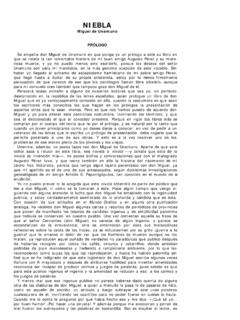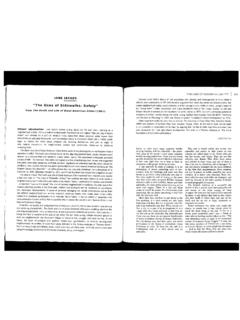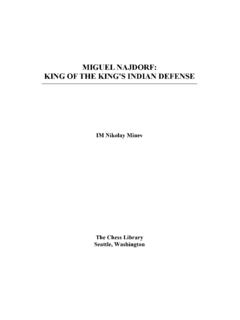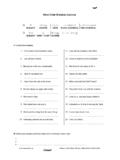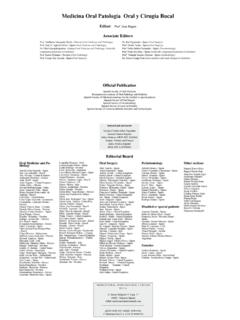Transcription of Miguel de Unamuno; His Life and Philosophy
1 Institute of World Culture 1 Miguel de unamuno ; His Life and Philosophy LIFE Miguel de unamuno was born in 1864 in Bilbao, Spain. Bilbao is a medieval port city on the Bay of Biscay in Basque Country near the northern border with France. The Basque people are known for being hard-working, practical and fiercely independent. The word basque may have come from Celtic etymology meaning summit or point , with the Basque people known as the mountain people , the tall ones , or the proud ones . unamuno certainly fits this description not only for his strong, proud personality, but for his physical appearance with his long pointed nose, his sharp pointed beard and his intense pointed eyes which led to his caricature nickname in later years as The Owl . Spain has had many opposing cross-cultural-currents at odds with one another over the centuries. Like in Russia, the world-views of East and West intersect and intertwine in Spain.
2 Politically the history of Spain has been one of constant strife and war and ideologically one of juxtaposing contradictions. It is interesting that unamuno s very earliest memory is of a Spain in conflict, when at the age of four a bomb landed on the roof of his next door neighbor s house during the Second Carlist War. Miguel s father died when he was 6 and he was raised by his mother, who was devoutly Catholic, and his liberal and formidable grandmother who was the predominate head of the family. At the early age of 11, inspired by a Jesuit priest who taught him classes on Psychology, Logic and Ethics Miguel aspired to sainthood. But this spiritual aspiration conflicted with the more earthly love he felt towards his childhood sweetheart, Concepcion, who later became his wife. When Don Carlos army was defeated in 1876, the Basques were punished for supporting his cause with the Law of 1876 which took Institute of World Culture 2 away many of their rights.
3 At the ripe age of twelve, angered by the injustice of this law, little unamuno wrote an anonymous letter of protest to King Alfonso XII which was the first defiant political act of one who was later to be known as the arouser of Spain. As he was preparing to leave for Madrid University to study Philosophy and literature, shortly before his 16th birthday, his grandmother died. He was present at her death and found the concept of mortality now took on a whole new existential reality. As he left for Madrid, his heart, filled with piety and religious zeal was already in conflict with his head which had an insatiable thirst for knowledge. Soon after he started attending the University of Madrid, in 1880, he stopped attending Mass and became a voracious reader of positivistic Philosophy , physiological psychology, and Italian and British poetry. He taught himself German in order to read Hegel and English in order to read Spencer and Carlyle (both of whom he translated into Spanish), just as two decades later he taught himself Danish in order to read Kierkegaard, before just about anyone outside of Denmark had even heard of the solitary philosopher.
4 He soon became part of an intellectual circle of students and writers that one of his teachers referred to as the little blasphemy shop on Montera Street. He also met many of the leading political thinkers of the time, which had formed into a group known as the Generation of 1868 dedicated to the renewal of Spain after the fall of the monarchy. In 1884 unamuno finished his studies in Madrid and presented his doctoral thesis on the problem of the origin and history of the Basque people applying a structured scientific method to his research. By the age of 20, unamuno knew 11 languages (and ultimately 14) Castilian, Basque, Greek, Sanskrit, Latin, Hebrew, Arabic, German, French, Italian and English. unamuno s college experience converted him from religion to science. As he wrote at this time, Seek the kingdom of science and its righteousness, and all the rest will be added unto you. After graduating unamuno moved back to Bilbao and spent the next 6 years barely eking out a living in his childhood city tutoring and writing newspaper articles.
5 He became engaged to marry Concepcion as soon as he had a solid career and wrote to her once about a disturbing, but life-affecting dream he had: One night there lowered into my mind one of those dark, sad, and mournful dreams which I cannot banish from my thoughts, even during moments of happiness during the day. I dreamed that I was married, that I had a child, that this child died, and that over its body, which seemed to be made of wax, I said to my wife: Behold our love! Shortly it will decay: this is the way everything ends. Institute of World Culture 3 For unamuno , committed to positivistic science as the way of progress and salvation, this dream of love and loss left all kinds of unsettling questions about purpose and meaning that empirical science had no language for. In 1891, Miguel de unamuno obtained a professorship in Greek at the University of Salamanca and married his childhood sweetheart, Concepcion.
6 The marriage was long and happy, as he wrote: the beginning of living life, and Salamanca was to be his home (from which he almost never left) for the rest of his life. He and Concha, as he fondly called her, had 8 children. Their third child, Raimundo, contracted meningitis at birth and was physically and mentally disabled, but much loved for the few short years of his life. Helpless before his son s condition, Miguel de unamuno fell into a deep depression until one night in 1897 when his wife awoke to find him weeping and uttered two words My Child! which somehow in the inner alembic of his heart had a radical life-changing effect on him. Writing about this episode many years later he said that Concha was: my own true mother as well. In a moment of supreme, of abysmal anguish, wracked with superhuman weeping, when she saw me in the claws of the Angel of Nothingness, she cried out to me from the depths of her maternal being, superhuman and divine: My child!
7 I discovered then all that God had done for me in this woman, the mother of my children, my own virgin mirror of holy, divine unconsciousness and eternity. He also wrote to a friend, I will never forget the tone with which on hearing me weep, she exclaimed, My Child! One can only imagine that the tone of those two words was quietly and tenderly soothing, empathetic and compassionate and perhaps most importantly intimate and personal. (This cathartic experience could have later led unamuno to the realization that for a man to have an authentic relationship with the Divine it can t come through an intermediary but must be intimate and personal). Recovering from this radical spiritual crisis, unamuno s first impulse was to renounce scientific rationalism and return by force to the faith of his childhood. He wrote the rector of his church in Bilbao for spiritual guidance and then went to spend Easter Holy Week in his presence trying through all the rituals and devotional meditations on Christ and the Virgin Mary to reinsert himself into the faith of his childhood.
8 But his effort to work out his salvation within the structure of the Roman Catholic Church in Spain did not succeed. Lamenting his dryness of spirit, he returned to Salamanca, where he continued to pour his inner turmoil into his diary, struggling at great lengths with life s fundamental questions. References to death (muerte) become so frequent that at last he comes to write the word simply as M. Speculating, it is Institute of World Culture 4 probably at this time in his development as a philosopher that he would have whole-heartedly agreed with Socrates statement in The Phaedo , that Philosophy is the preparation for death. unamuno was a man adrift: science and rationalistic Philosophy did not have answers for the questions of his heart and the dogmatic belief structure of the Church was too unsatisfying and superficial for his mind. Reason and faith were powerful opponents pitted against each other in unamuno s breast.
9 As one writer puts it: unamuno lived, as few men and writers have lived, in conflict and contradiction, and it is precisely this living in inner strife which constitutes the core of his thought, of his literary work, of his significance. unamuno was appointed by royal decree to be the rector of the University at Salamanca at the turn of the century, but this did not prevent him from being outspoken about the failings of the monarchy in their ruling of Spain. On one occasion he was censured by the King of Spain for something he had written and was not allowed to leave the city. Then the King decided to pardon him, and when the royal telegram arrived he was seated in the Plaza Mayor surrounded by his disciples. When he read it out everyone present cheered, but unamuno was furious, for he had ceased to be a victim. The pardon had taken away the conflict. On another occasion His Majesty awarded him the Cross of Alfonso XII, and unamuno went to Madrid to receive the decoration.
10 When he was ushered into the king s royal presence, he said, in his blunt way: I present myself before Your Majesty because you have conferred upon me the cross of Alfonso XII, which I deserve. It is strange, replied the King, that the other recipients of the cross all assured me that they did not deserve it. And they were right, replied unamuno . Even with this honor unamuno s bitter hostility to Alfonso XIII and the new regime of Primo de Rivera did not cease, and his attacks culminated in his exile to Fuerteventura, one of the Canary Islands. As the police escorted him to the train station a crowd of students followed. And as he stepped on the train he said to the crowd, I shall be back, not with my freedom, which counts for nothing, but with yours. His exile to this desolate and arid island made him famous in Europe and America as a champion of human rights and liberties. He continued to write scathingly of the king as the whiskey and roulette senorito and Primo de Rivera and his officials as lads from a military casino.



